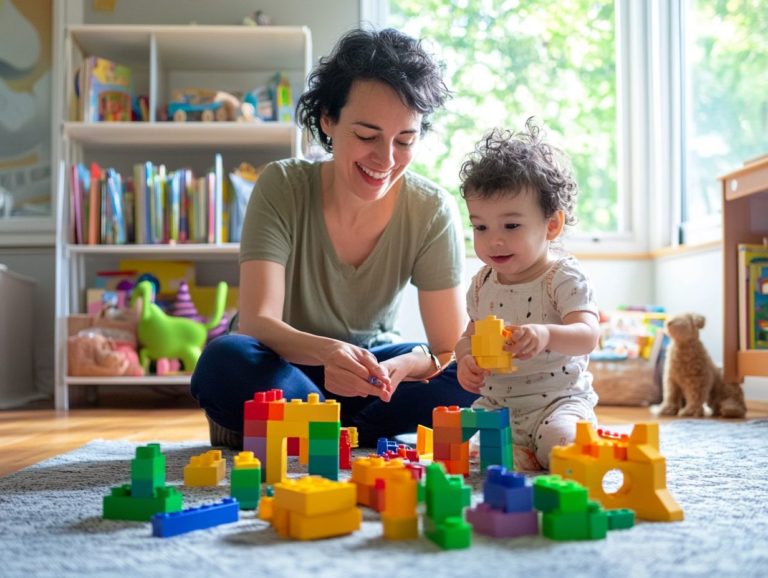Navigating Difficult Conversations with Kids
Engaging in difficult conversations with children may seem overwhelming, yet these discussions are essential for their emotional and social development. Parents can establish trust by being open and honest and by modeling calm behavior during these interactions.
From confronting the realities of death and loss to navigating the complexities of challenging world events, like the geopolitical tensions in Eastern Europe, parents need to address a plethora of sensitive topics, including bullying and physical pain.
This article delves into the significance of these conversations, highlighting common subjects that arise and presenting effective strategies for approaching them.
Nurturing open communication cultivates a trusting environment. In this space, children can comfortably express their feelings and seek guidance. This includes being prepared to answer tough questions and offering ongoing support.
Contents
- Why Are Difficult Conversations Important to Have with Kids?
- Talking About Tough Topics with Kids
- Frequently Asked Questions
- What are some common difficult conversations that parents have to navigate with kids?
- How can I prepare myself for a difficult conversation with my child?
- What are some tips for having a difficult conversation with a child?
- How can I support my child during a difficult conversation?
- What if my child becomes upset during a difficult conversation?
- What if I don’t have all the answers during a difficult conversation?
Key Takeaways:

- Difficult conversations with kids are important for their emotional and social development.
- Common difficult conversations with kids include discussing death, divorce, world events like Covid-19, bullying, peer pressure, and sex.
- Parents can prepare for these conversations by educating themselves, considering the child’s age, and planning the conversation. Resources like Meg Foundation and Doing Good Together can be helpful.
Why Are Difficult Conversations Important to Have with Kids?
Engaging in difficult conversations with your kids is crucial for understanding and managing feelings and enhancing open communication. Parents need to follow their lead and ask open-ended questions like, “What do you know about this topic?”
This approach provides a safe space for them to express their feelings. By having these discussions, you build trust and prepare your children to navigate life s challenges be it dealing with death, experiencing divorce, or confronting bullying.
These conversations equip them with the skills necessary to manage their emotional responses in a healthy way. Experts like Jody Thomas, PhD, and resources from Stanford University emphasize the importance of providing accurate information and being honest.
Addressing sensitive topics with age-appropriate language ensures your children feel secure and supported as they explore their emotions.
What Are Some Common Difficult Conversations with Kids?
You often encounter challenging topics when discussing difficult conversations with your kids. These cover sensitive subjects like death and loss, divorce or separation, and significant world events such as Covid-19 and events in Eastern Europe. It is crucial to create a safe environment where kids feel comfortable sharing their feelings.
These conversations are essential as they arm your children with the knowledge and emotional tools necessary to navigate complex issues. Discussing bullying and peer pressure helps them understand social dynamics, while conversations about sex and relationships foster healthy development and enhance their emotional understanding.
1. Talking About Death and Loss
Discussing death and loss can be one of the most challenging conversations you face as a parent, often prompting strong emotional reactions and touching on traumatic events your family may have experienced.
Navigating this sensitive terrain requires a thoughtful approach that honors your child s developmental stage and understanding. Use age-appropriate language that aligns with their experiences. By addressing these topics openly, you can reassure them that feeling a range of emotions, including sadness and confusion, is perfectly okay.
Encouraging your children to express their visible emotions not only validates their feelings but also fosters a safe space for communication.
Ultimately, your support during these conversations lays the groundwork for emotional resilience and equips them with healthy coping strategies as they navigate their grief.
2. Discussing Divorce or Separation
Discussing divorce or separation with children requires a delicate touch and a keen awareness of their emotional responses. This life-altering event can profoundly affect their well-being.
To navigate this intricate conversation effectively, prioritize building trust through open dialogue. Use age-appropriate language that resonates with their understanding while avoiding overwhelming details.
Providing a consistent source of support can significantly ease their anxieties as they process this transition. Check in regularly with gentle questions about their feelings; these discussions can cultivate a sense of emotional safety.
Helping children adapt to these changes is crucial. Maintaining a supportive environment empowers them to express their emotions more freely.
3. Explaining Difficult World Events
Explaining complex world events, like the impact of Covid-19 or political conflicts in Eastern Europe, requires emotional intelligence and the practice of really listening. This helps you understand your child’s feelings.
Initiating a dialogue about these topics is key, as it allows your child to process the information they’re absorbing from the news. Start with open-ended questions like, “What do you know about what’s happening?” This invites them to share their thoughts and provides valuable insight into their perspective.
Equally important is validating their feelings. Reassure them that it s normal to feel anxious or confused. By creating a safe space for them to voice their concerns, you engage them in meaningful conversations and help them develop a nuanced understanding of the world.
4. Addressing Bullying and Peer Pressure
Addressing bullying and peer pressure is essential for you as a parent, as these issues can significantly impact your child’s emotional well-being and self-esteem.
Recognizing the subtle signs of distress in your children is crucial. Look for changes in behavior, such as withdrawal from friends or mood swings that fluctuate unexpectedly. Cultivating an open environment is vital, allowing your children to feel safe sharing their thoughts.
Engaging in regular discussions about social dynamics encourages your kids to express their feelings and discuss their dilemmas. One effective approach is to practice really listening, letting your children articulate their experiences without fear of judgment.
Encouraging visible emotions and taking deep breaths can help them relax and open up. This facilitates meaningful conversations that help them navigate the complexities of peer interactions.
5. Talking About Sex and Relationships

Discussing sex and relationships is a vital part of parenting. Start these conversations early to foster healthy attitudes toward intimacy and respect. Limit screen time and provide opportunities for open dialogue.
It s important to be honest and address common misconceptions about sex and relationships. Provide accurate information that aligns with your child s age and maturity level.
Creating an environment where your children feel comfortable asking questions helps them develop critical thinking skills on these important topics. Don t hesitate to seek support from books, workshops, or counseling services for additional guidance on navigating this sensitive subject with confidence and care.
How Can Parents Prepare for Difficult Conversations with Kids?
Preparing for challenging conversations with your kids requires careful thought and insight. This enables you to tackle sensitive subjects like emotional responses and traumatic events with assurance. By educating yourself on these topics and planning the conversation ahead of time, you can foster a safe space where your children feel comfortable sharing their thoughts and feelings.
This thoughtful preparation allows you to use age-appropriate language that truly connects with their level of understanding. It ensures the discussion is both meaningful and impactful. Experts like Dr. Sarah Ruiz from the Packard Pediatric Pain Rehabilitation Center emphasize the importance of modeling calm and following up regularly.
1. Educate Yourself on the Topic
Educating yourself on the topic at hand is absolutely vital for you as a parent when engaging in those challenging conversations with your kids. It gives you the power to tackle sensitive subjects with a level of understanding and empathy that truly makes a difference.
Utilizing resources like informative books, workshops, and expert seminars can significantly broaden your knowledge base. Organizations such as the American Federation for Suicide Prevention and National Public Radio offer valuable insights.
These tools provide valuable insights into child psychology and developmental stages, allowing you to communicate more effectively with your children. Nurturing emotional intelligence, or the ability to understand and manage emotions, is essential. It helps kids cope better with challenges. Encouraging time outdoors and physical activities can enhance their emotional well-being.
By modeling honesty and transparency, you create an atmosphere of trust where they feel secure discussing their feelings and concerns. This approach not only strengthens family bonds but also equips your children with the skills they need to navigate the challenges life throws their way.
2. Consider the Child’s Age and Developmental Stages
Considering your child’s age and developmental stages is crucial when planning challenging conversations. This awareness enables you to tailor your language and approach effectively to meet their needs.
Younger children, for example, often understand loss in a very literal sense, connecting it to their own experiences, such as the death of a beloved pet. As children mature, they begin to grasp more complex topics like divorce or bullying, which can stir up intense emotions. In these moments, it s vital for parents to listen actively to their thoughts and feelings, ensuring they feel heard and valued.
Be open to adjusting your explanations based on their reactions. This creates a safe environment for meaningful dialogue. This kind of adaptive communication not only fosters resilience but also equips them to navigate their emotions in a constructive way. Providing reassurance during these moments can make the difference.
3. Plan Out the Conversation
Planning out your conversation before diving into tough topics with your kids can be a game changer. It allows you to maintain focus and navigate any emotional responses that might pop up during the discussion.
By setting clear objectives and understanding the key points you want to address, you can guide the dialogue more effectively. It’s important to pinpoint the main subjects that need coverage and ensure they resonate with your child’s age and maturity level.
Anticipating potential questions that could arise during the conversation sets the stage for smoother communication. Trust is paramount; a safe environment helps kids open up about their feelings. Lastly, limit screen time before these heart-to-heart talks. Kids need time outdoors to balance their emotions, which fosters genuine interaction and makes it easier for you to connect on a deeper level.
How Can Parents Approach Difficult Conversations with Kids?
When you approach difficult conversations with kids, it’s essential to do so with sensitivity and an awareness of how to cultivate a safe environment. Creating a space where children feel comfortable sharing their thoughts and emotions is crucial.
Engage in active listening; let them know that expressing their feelings openly is not just acceptable but encouraged. This approach establishes the foundation for an honest dialogue, allowing children to feel truly heard and valued as they navigate tough questions and emotional responses. Educating yourself on the topic can also enhance your ability to provide ongoing support.
1. Create a Safe and Open Environment
As a parent, creating a safe and open environment is key. It encourages your children to share their feelings during tough conversations.
By minimizing distractions, you enable your kids to focus entirely on what s being discussed. This allows for deeper engagement.
Setting aside dedicated time specifically for these important talks not only conveys significance but also helps your children feel respected and valued.
Using reassuring language is vital; you should always aim to model calmness, letting them know it s perfectly okay to express their feelings. Reassure them throughout the conversation to create a trusting atmosphere.
This approach not only encourages openness but also builds trust, giving them the confidence to share their thoughts without any fear of judgment.
Ultimately, by nurturing a warm environment where open communication flows freely, you can significantly enhance your children’s emotional well-being.
2. Use Age-Appropriate Language

Using age-appropriate language is essential when navigating difficult conversations with kids, ensuring they can grasp the topic and feel included.
By tailoring your communication to align with a child’s developmental stage, you effectively bridge the gap between complex subjects and their understanding. This approach builds a sense of security and trust and encourages children to share their thoughts openly.
It s important to remain flexible in your language, taking into account the child’s age and maturity, while also anticipating potential questions that may emerge.
When handled thoughtfully, these conversations empower children to engage actively and feel valued in discussions that might otherwise seem daunting. Be prepared to ask open-ended questions to facilitate deeper engagement.
3. Listen and Validate the Child’s Feelings
Listening to and validating a child’s feelings during difficult conversations is essential for fostering trust and nurturing open communication between you and your child.
To elevate these interactions, you can employ techniques that enhance connection. For instance, reflecting on what your child expresses demonstrates your attentiveness and ensures they feel genuinely heard.
By asking open-ended questions, you create opportunities for your child to delve deeper into their feelings, paving the way for a more enriching dialogue. Follow their lead to maintain a natural flow of conversation.
Instead of settling for simple yes or no questions, try asking, “How did that make you feel?” This approach invites your child to explore and articulate their emotions, cultivating a safe space where they can freely express themselves.
4. Provide Reassurance and Support
Providing reassurance and support is essential for you as a parent when navigating challenging conversations. This approach helps your child process their emotional responses, making them feel safe and secure in sharing their thoughts.
When you actively listen and validate your child’s feelings, you create an environment that prioritizes emotional well-being. This openness fosters trust and encourages your child to seek support whenever they need to unpack their emotions further.
By being available for follow-up questions, you can guide your child through their complex feelings, reinforcing that it’s perfectly normal to feel anxious or confused.
Your ongoing support, combined with the assurance that their feelings are acknowledged, empowers your child to build resilience and gain clarity on their emotional journeys. Consider engaging with professionals from institutions like Stanford University or the Packard Pediatric Pain Rehabilitation Center for additional support.
How Can Parents Continue the Conversation and Offer Support?
Continuing the conversation and providing ongoing support is essential for you as a parent who wants your child to feel secure and understood, especially after tackling challenging topics.
Regularly checking in on your child helps you understand their feelings while creating opportunities for deeper dialogue. This proactive approach reinforces the message that you are always available to address concerns, validate feelings, and nurture healthy emotional intelligence.
Don t wait! Begin these important talks today to strengthen your bond with your child.
Talking About Tough Topics with Kids
1. Check in with the Child Regularly
Regularly checking in with your children after tackling difficult topics is essential for understanding their emotional responses and offering ongoing support.
To make these check-ins effective, consider weaving them into your everyday activities. Casual conversations during family meals or dedicated moments of reflection during game nights can create the perfect environment for open dialogue.
These relaxed settings naturally encourage discussions about feelings and thoughts. Remember to ask open-ended questions that invite your children to express themselves freely, reinforcing their sense of value and understanding.
Taking deep breaths together can help calm visible emotions. By providing opportunities for dialogue, you foster a safe space where they can share their concerns and emotions without fear of judgment, ultimately strengthening the bond between you and your children.
2. Be Available for Questions and Further Discussion
Being available for questions and further discussion is crucial for you as a parent when supporting your child after challenging conversations. This openness encourages your children to express their ongoing feelings and thoughts.
This transparency not only fosters trust but also enables you to gain deeper insight into what your children are grappling with internally. By creating a nurturing environment, you can effectively guide them, helping them navigate their emotions and thoughts with greater ease.
Following their lead during these discussions demonstrates your active listening, validating their concerns and encouraging them to share even more. This two-way communication is essential for building strong relationships, giving your children the confidence to voice their feelings and reinforcing the notion that their thoughts and emotions hold significant value.
Remember to talk directly and reassure them that it s okay to ask about anything on their mind.
3. Don t Hesitate to Reach Out for Help When You Need It!
When you find yourself feeling overwhelmed while talking about tough topics with your kids, seeking outside help from professionals like a pediatric health psychologist (a specialist who helps children with emotional and psychological issues) can be an invaluable step. This professional guidance is especially beneficial in tackling the complex emotions that often arise during challenging times.
By educating both yourself and your children about mental health, you can equip your family with essential tools and strategies to manage feelings more effectively. Support groups can also provide a sense of community, where shared experiences foster understanding and help reduce the stigma associated with discussing emotional challenges.
Engaging with these external resources not only assists in immediate coping but also promotes long-term emotional resilience, empowering your family to approach life’s ups and downs with enhanced confidence.
Don t hesitate to seek out support; organizations like CHOC and the Meg Foundation are here to help you with valuable resources.
Frequently Asked Questions

Some common difficult conversations that parents have to navigate with kids include topics such as death, divorce, bullying, puberty, and mental health. It s important to talk about these issues openly and honestly, using age-appropriate language to ensure that children understand and feel safe.
How can I prepare myself for a difficult conversation with my child?
Talking directly about difficult topics with your kids is essential. It’s important to take some time to think about what you want to say and how you want to say it. Practice talking about the topic with a friend or partner beforehand. It’s also helpful to educate yourself on the topic and be prepared to answer any questions your child may have.
Consider what you know about the topic already and what more you need to learn. This helps in modeling calm and ensuring you can communicate effectively.
Share your thoughts and questions in the comments below!
What are some tips for having a difficult conversation with a child?
Choose a time and place where both you and your child feel comfortable. Use age-appropriate language and be honest and direct.
Listen to your child’s perspective and validate their feelings. Remaining calm and avoiding defensiveness or dismissiveness is crucial for establishing trust and creating a safe environment for open communication.
How can I support my child during a difficult conversation?
Let your child know that you are there for them and that they can come to you with any questions or concerns. Reassure them that their feelings are valid and that you are there to help them through it.
Offer resources and support, such as therapy or counseling if needed. Remind them that it’s normal to have emotional responses to difficult topics, and assure them that you will provide ongoing support.
What if my child becomes upset during a difficult conversation?
It’s normal for children to become upset or emotional during difficult conversations. Allow them to express their feelings and offer them comfort and support.
Take breaks if needed, and continue the conversation when both you and your child feel ready. Encourage them to take deep breaths and reassure them that it’s okay to feel emotional about tough questions.
What if I don’t have all the answers during a difficult conversation?
It’s okay to not have all the answers. If you are unsure about something, be honest with your child and let them know that you will find out more information and get back to them.
It’s important to follow through and address any unanswered questions or concerns your child may have. Pay close attention to what your child says, as this helps to establish trust. Don’t hesitate to seek support from professionals or organizations like the Meg Foundation.






